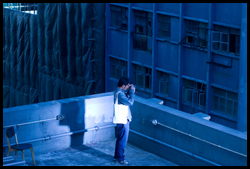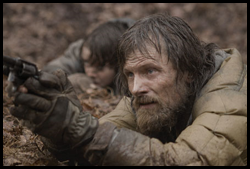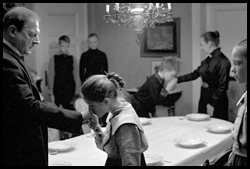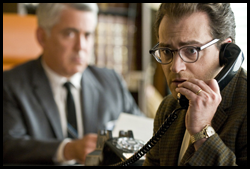 |

|
Accident (Yi
Ngoi) |
|
A film that's in desperate
need of a (better) remake, Johnny To-produced Accident manages to
completely ruin a terrific start. The opening sequence is downright delightful
- a group stages murders for hire, making them seem random occurrences. These
"McGyvers of murder" are set loose, with the victim subtly pushed towards his
doom using normal objects in extraordinary ways. Full of Rube Goldberg-like
fun, these opening reels speak to the power of the premise.
Unfortunately, it all goes seriously awry -
instead of seeing the film we're promised (competing accident-causing gangs
trying to outdo one another), we're instead treated to a disappointingly
generic tale of paranoia and insanity. By the end it's a cheap cop out, a
telegraphed ending that simply deflates all the promise of the start.
I look forward to the film we were setup to see,
a classic Spy vs. Spy action movie where the filmmakers don't succumb to banal
psychological exploration of their lead characters. Until then, watch
Accident as a minor pleasure, more frustrating for what could have been
given the materials at hand. |
|
 |
|
Directed by: Soi Cheang
Grade: B |
|
|
The Road |
|
How does one rate a film
that's terrifically produced, well shot and directed, with great acting, yet it
all seems somehow... hollow? The Road, based on the celebrated novel by Cormack
McCarthy, is a cerebral, haunting tale of post-apocalyptic misery. However,
through no explicit fault of the film, it all seems so straight forward, so
clear which direction the path is going to take, that the Road leaves one
unfulfilled.
Viggo once again pulls out all the stops, and he
seems genuinely close to death through much of the film. The horror of the
world is shown in bitter detail, but there are a number of distractions from
the visual medium of film that, I fear, may detract from the work. Where in a
book one can simply describe a starving, emaciated child, there's great
difficulty in suspending disbelief in the film, in not being distracted by
those things that indicate over and over again that the world shot isn't in
fact dead.
It's a compelling enough premise that one's left
looking for ways of surviving, from the leaves littering the ground to burning
tires for fuel. Yet, of course, this simply should be accepted as a limitation
of the visual information the film portrays.
In the end, however, these distractions make the
whole affair less awful, less heart wrenching than the book no doubt must be.
As it plays, there's just such a plodding trudge of the story, where everything
expected of such a tale unfolds in like some pulp procedural drama.
I'm comparing directly to the last McCarthy
book to be filmed, the sublime "No Country...", where, frankly, I was never
sure what was to happen, who was to live or die. Not so for "The Road", locked
to its narrative path, telegraphic the ending early on, removing all sense of
suspense at the detriment to the tale. While all the elements should be there
for a fine film, it simply does not come together in the end. |
|
 |
|
Directed by: John
Hillcoat
Grade: B |
|
|
White Ribbon (Das Weisse
Band) |
|
Haneke's films are usually
quiet ruminations about character interactions followed by explosions of
violence and terror. With White Ribbon, he has crafted an almost
dreamlike tale, a throwback to an older, slower, more literary cinematic form.
Shot in a stunning black and white palate, this is a poetic, elegiac film
without the usual pretension or ponderousness that these terms connote.
Superficially, the plot is about a small town in
Germany just before the start of the Great War. A series of crimes occur,
unsettling the quiet of the small town. This causes disruption in the steady
order, from parent to child, baron to worker, priest to congregation. We see in
almost pedestrian fashion the infection of evil spread, with small actions of
hatred growing ever larger.
Yet the film, with tremendous restraint, never
escalates outside the scope of the town. The point, it seems clear from the
opening monologue, is to show the sheer banality of evil, the startling ease by
which the actions of even children (taught by the provocative, yet common
brutality of their parents' strictness) can lead to devastating consequences.
It cannot for a moment be forgotten the films
tacet historical undertone - these children, after all, grow up to be the core
of the National Socialist movement, and in so doing they fulfill the sins of
their parents' abusive behaviour. Yet, the film is far more universal in its
exploration, a universality that's in direct odds with the claustrophobic,
small-town setting. By contextualizing the everyday evil, the small mindedness
and petty bickering, Haneke exposes in a beautifully subtle way the real force
of actions that spelled doom for untold millions. In other words, this
contagion of evil, from parent to child, is hardly unique to the German volk.
The evil of dogmatism, of a certain small-minded, provincial attitude that
when taken to its extreme form results in the seemingly inevitably cyclic
brutality on a mass scale, is the core "horror" that underlies this film.
Eschewing over-the-top gore, this film horrifies with the commonplace nature of
the actions of almost everyone in the town.
This is a beautiful,
haunting work. |
|
 |
|
Directed by: Michael
Haneke
Grade:
A- |
|
|
A Serious Man |
|
Kabbalah, existential
rabbinical analysis and quantum physics, with a Yidisshe theatre opening act -
what's not to love from this latest work of brilliance by the Coen boys?
Broadly, this is a film about mystery, about whether there is or isn't
cause for suffering, injustice, bad luck. It's a film resolutely free of
answers yet filled with questions and frustrations, and thus even without the
wonderful opening sequence this is the Coen's most Hebraic film yet.
Set in the late 60s of Minnesota, their production evokes a time of
manicured lawns, school bullies, and the emergence of Jefferson Airplane as
insight into the Mishna. The performances from a across-the-board cast are
superb (Richard Kind is really the only "name" actor I was aware of, save for
the inimitable Fyvish Finkel!), evoking the insanity of being part of the
Jewish community of a Midwestern suburb.
This twisted, brilliant
Job-sian myth is densely constructed, and its humour may be too dry for those
looking for the broadness of a Fargo, Raising Arizona or even
Oh Brother, but there are moments that are of such sublime humor and
intelligence that it echoes Lebowski. And that, naturally, is high
praise indeed. |
|
 |
|
Directed by: Joel and
Ethan Coen
Grade: A |
|
|
 |
|
